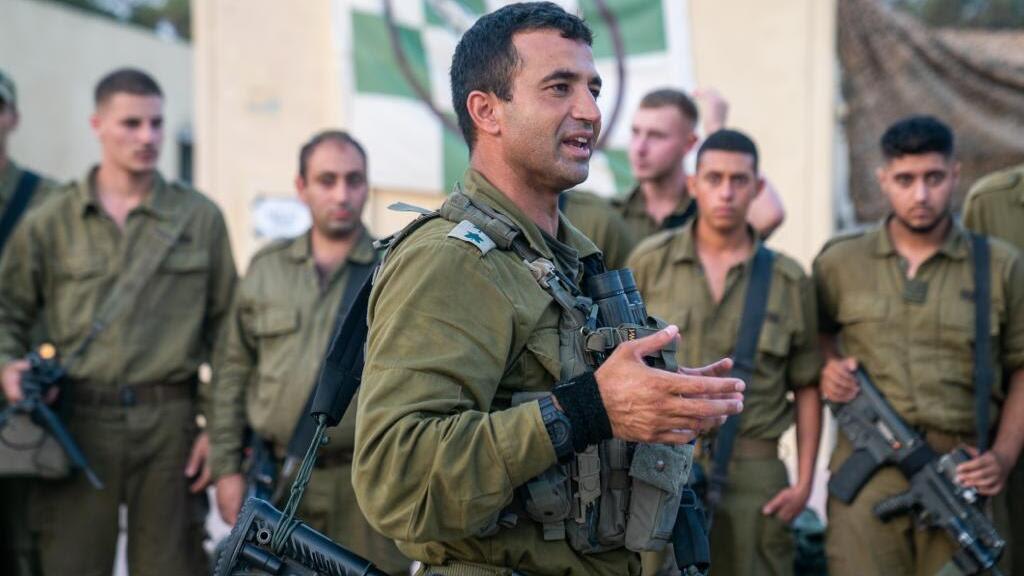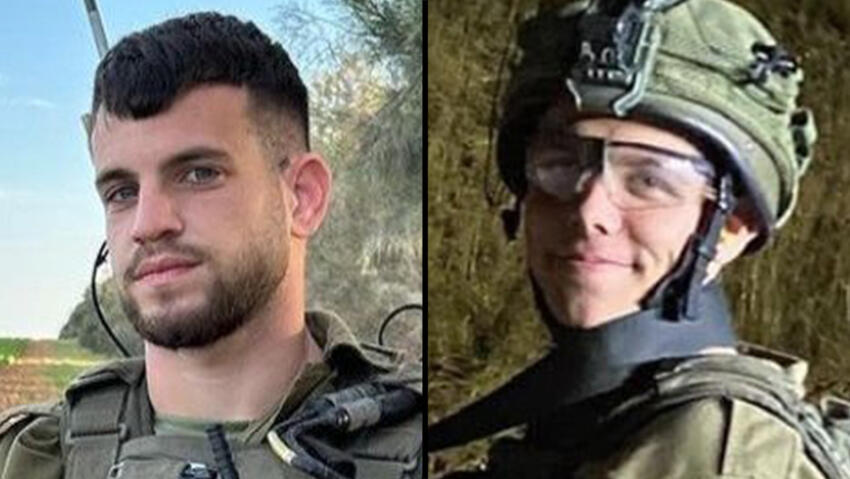Saturday, on his 41st birthday, the fall of Israeli hero Major General Assaf Hammi, commander of the Southern Brigade in the Gaza Division, was cleared for publication. His wife, Sapir, and his three children, Arbel, Alon and Ella, along with his parents and relatives, wanted to celebrate the birthday together first and only then inform the public about the loss.
Read more:
Although his body has been in the hands of Hamas since the October 7 attack, they will accompany him on his last journey to the cemetery in Kiryat Shaul, where he will be buried like his uncle, the late Eitan Hamami, who fell during a military exercise, and his grandmother's brother, the late Yair Tzabari, who fell during his service. Three generations have suffered losses. Shoshana Hamami lost a brother, a son and now her grandson, Asaf.
2 View gallery


Major General Assaf Hammi, commander of the Southern Brigade in the Gaza Division, fell in battle on October 7
(Photo: IDF Spokesman's Unit)
The decision to determine his death and hold a funeral was made due to reliable information received and the approval of the chief military rabbi. It is difficult to exaggerate the importance of these decisions from a human and halachic (religious Jewish law) point of view, and they show the enormous dilemmas that come with this war.
The late Hamami enlisted in 2001 and his path in the Israel Defense Forces began in the Givati brigade. In 2010, he received the Distinguished Service Medal from then-IDF Chief of Staff Gabi Ashkenazi. He advanced in the chain of command and served from 2016 to 2018 as commander of the Tzabar Battalion. From 2018 to 2020, he led the commando brigade's training base and, between 2020 and 2022, he served as commander of the Negev Brigade. In May, he was appointed commander of the southern division in Gaza, which is considered the most difficult and challenging. "We will continue to protect the residents of the sector and prepare the division for war," he declared upon taking office, and it wasn't just talk.
Hamami knew every thorn, leaf and path in the section. He was known for never overlooking even a tiny detail, and also as a strict commander with his soldiers ever on alert. Every morning at dawn, he would require them to hold a "dawn alert" exercise. Not long ago, I met the commander of the Bedouin patrol unit, Lt. Col. Guy Madar, who was wounded in the war, while he was at Beilinson Hospital. He said that Hamami drove him and brigade staff crazy, and constantly warned of Hamas raids. "He drove us crazy as if at any moment Hamas was planning to penetrate the Gaza border," he said.
On Simchat Torah, he remained on the base with his 6-year-old son, Alon. At 6:29 a.m., when he heard of the first breach of the fence, he kissed the boy's head, handed him over to one of the female officers of the brigade and was the first to leave the base, with two other soldiers - the brigade commander's liaison Sgt. Tomer Yaakov Achims and brigade commander Sgt. Kirill Brodsky - to fight the Hamas terrorists who, at this stage, had not yet approached the base. As the rockets whistled above him, he grasped the magnitude of the event and announced on the comms to the Gaza Division the message that echoed everywhere: "This is Commander, declaring war."
Col. Hamami opened the gate of Kibbutz Nirim using the code in his possession and waged a battle against terrorists from the Nukhba Force, a special unit of the Izz al-Din al-Qassam Brigades, the military wing of Hamas, until he was seriously wounded. Achims and Brodsky took him to a shelter and continued to fight. Achims also tried to place a tourniquet on Hamami and write, under fire, according to the procedure known to everyone who passed the basic emergency medical course: "H.E. 6:49", i.e. the time when the tourniquet was placed. Between 7:01 a.m. and 7:05 a.m. Achims was heard on the comms: "A leader has been hit, requires immediate evacuation." The evacuation did not come and two other soldiers were also killed later in battle and their bodies were kidnapped by Hamas into Gaza.
2 View gallery


Sgt. Tomer Yaakov Achims and brigade commander Sgt. Kirill Brodsky
(Photo: IDF Spokesman's Unit)
In retrospect it turned out that the Hamas terrorists were looking for Hamami. Hundreds of terrorists were caught with his picture and a demand to locate the most senior officer. However, Hamami was already deep in the battle at that time, as befits an officer who did not take a vacation with his family, who was connected to the men serving the Gaza border rather than from the division, who would go out first thing in the morning to patrol the fence and go to bed last after his soldiers.
Finally, Hamami fell while fulfilling his duty and mission: to save the residents of the Gaza envelope communities. Hamami was one of the first to jump into battle with his soldiers and was also one of the first to fall, in the battle for Kibbutz Nirim. Five of the residents of the kibbutz were murdered and another five were kidnapped, in the second wave of terrorists.
More will be told about Col. Assaf Hamami and the awards of excellence that he personally, and the units under his command, received. He never bragged or even talked about them. In fact, he used to take off his uniform when he arrived at the homes of his soldiers, so that he could talk to their parents at eye level and not as a senior officer. The phrase most associated with him was "It's not difficult" - his constant response to every task assigned to him, big or small.
"The best fighter I've ever known and one of the best people I've ever known," said Maj. (res.) Eli Zilberman, who served as a company officer for him in the Tzabar Battalion. "He managed to touch everyone. He would call my wife every Friday, tell her Shabbat Shalom and ask if there was anything she needed. A man of the people. He combined command from the front and always gave the impression that everything that is important to you is also important to him. He had the biggest heart. This is a huge loss."
More than once he told his soldiers that he would not let Hamas capture him alive, and if, God forbid, he was wounded and taken prisoner he would order them to kill him so that he would not be capturedp alive. He was soon to finish his post and go to study abroad. His dream was to be a school principal, but his commanders managed to keep him in the service with a future promise to become the commander of the Givati Brigade or to command the Commando Brigade, the places where he grew and flourished and also raised fighters who now carry on his legacy.
Hamami is one of three sub-generals who have fallen in battle since the start of the war, and they are the most senior officers killed in it. The other two are the commander of the Nahal Brigade, the late Col. Yonathan Steinberg, and the commander of the Multidimensional Unit, the late Col. Roy Levy. Steinberg was the first IDF soldier killed in the war whose name was allowed to be published. On the morning of October 7, he left his home in Kibbutz Shomria to fight. On his way there, he encountered terrorists near the Kerem Shalom crossing, fought against them alone and was killed.
Levy fell in a battle with terrorists in Kibbutz Re'im, to which the unit under his command was sent. The battle, in which about 10 terrorists were killed, was intended to save the residents of the kibbutz who were besieged in their homes. Levy was mortally wounded in Operation Protective Edge in 2014, when he was the commander of the Golani patrol battalion. After a grueling rehabilitation process, he fulfilled his dream of commanding an elite Egoz unit and was chosen to light a torch at the national ceremony on Israel Independence Day.
The fall of the three leaders shows the inspiring character of the future generation of field commanders in the IDF, who did not hesitate before going out to defend the home front and did not believe in commanding behind elaborate LED screens. They were called, they responded and they died a hero's death. May their memory be a blessing.


